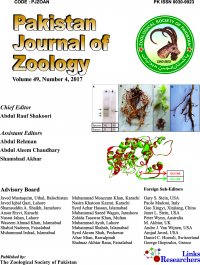1Key Laboratory of Zoonosis Research, Ministry of Education, Jilin University, Changchun 130062, China
2College of Animal Science, Jilin University, Changchun 130062, China
Hengtong Fang and Hao Yu contributed equally to this article.
ABSTRACT
Although mounting evidence has shown that mycotoxins can cause intestinal dysfunction and mucosal immune disorders, the effect of zearalenone (ZEA) on intestinal mucosal function remains controversial. We aimed to explore the effects of short-term ZEA exposure on the mucosal barrier function in the colon. We found that the morphology of colonic mucosa in mice was normal after ZEA was administered by gavage for one week, the mRNA expression levels of mucosal Mucin-1, Mucin-2, regenerating islet-derived protein 3 gamma (Reg3γ), and tumor necrosis factor (TNF) were significantly downregulated. The mRNA expression levels of mucosal β-defensin, regenerating islet-derived protein 3 alpha (Reg3a), regenerating islet-derived protein 3 beta (Reg3β) and secretory immunoglobulin A (sIgA) levels were significantly increased. The interleukin-1beta (IL-1β) level was decreased. 16s RNA sequencing further indicated that the colonic microflora had changed, especially the Lactobacillus had increased significantly. Our study showed that short-term ZEA exposure led to resistive increase of colonic probiotics in mice, especially the increase of lactobacillus can reduce intestinal mucosal immunotoxicity.
To share on other social networks, click on any
share button. What are these?









